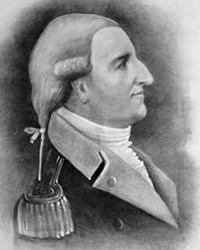Home - QM Leadership - Current QMC - Past QMCs - QMG MG Wilkins, Jr.
7th Quartermaster General
Major General John Wilkins, Jr.
Quartermaster General | June 1796 - June 1802
 John Wilkins, Jr. was born in Donegal township, Lancaster County, Pennsylvania, in 1761, but within two years his father had moved the family westward to Carlisle.
John Wilkins, Jr. was born in Donegal township, Lancaster County, Pennsylvania, in 1761, but within two years his father had moved the family westward to Carlisle.
Ardent supporters of the Revolution, both father and son fought in its campaigns. John Wilkins enlisted at the age of sixteen, still in his teens, he was officially listed as a surgeon's mate in the 4th Pennsylvania Regiment in 1780. He transferred to the 1st Pennsylvania at the beginning of 1783 and served until the close of the Revolutionary War. It was undoubtedly as a result of his service as surgeon's mate that he won the nickname "doctor."
After the war to Wilkins established a store in western Pennsylvania. He was a brisk, energetic trader, alert to every venture that promised profit. By the summer of 1790 he moved his store to Presque Isle to tap into the fur trade. During the next five years Wilkins eagerly pursued every business opportunity. He engaged in a profitable trade. But his arrangements to deliver flour to the William Duer, who was supplying rations to the western army garrisons and was soon to be responsible for supplying the St. Clair expedition, did not prove advantageous.
In the spring of 1793 Pennsylvania Governor Mifflin appointed Wilkins Brigadier General of the Allegheny County militia. Unrest was stirring western Pennsylvania. Imposition of an excise on whisky caused the frontiersmen, whose grain had to be made into whisky if it was to be profitably transported to market, to rise in rebellion in the summer of 1794. Wilkins had early taken note of the unrest but seemed confident that he could collect the tax if authorized to do so, and, in his capacity as storekeeper, he bought whisky only from those distillers who had paid the excise. When the insurgents threatened to destroy Pittsburgh unless they were joined in a display of force against the excise at Braddock's Field, the town's defenders marched out under the supervision of General Wilkins, and by an skillful use of friendly resolutions drafted by a committee of responsible citizens, and a free distribution of whisky, managed to divert the wrath of the insurgents, to the great relief of the town's inhabitants.
Wilkins continued to build up his business and land interests and was still serving as a Brigadier General of the Allegheny militia when Washington appointed him Quartermaster General of the army on June 1, 1796. He immediately wrote General Wayne that he would proceed "with all expedition" as soon as his instructions and commission arrived from the Secretary of War. Four months later he informed the commander-in-chief that he had ''particular business at Pittsburgh, which induces me to relinquish my appointment." Apparently his resignation was not accepted because he continued as Quartermaster General for six years until the office was abolished by Congress on March 16, 1802.
His administration of the office was unspectacular but satisfactory. During his administration the threat of war with France led to a sudden expansion of the Army in 1799 to more than 51,000 men, about ten times the strength under General Wayne, and nearly twenty-five times that under General St. Clair. However, the next year, with the danger past and enlistments and military appointments suspended, the army was again reduced to approximately 4,000 men. Wilkins' principal duty was to arrange for the transportation of supplies to the garrisons stationed at the western posts. His accounts show expenditures for forage, carpenters, wagoners, services in transporting public money, the hire of conductors of military stores, and similar entries.
After his office was abolished he turned his full attention to building the fortunes of the Wilkins family in Pittsburgh. He served as the president of city's first bank organized in 1802. John Wilkins died suddenly in Pittsburgh on April 20, 1816, when he was fifty-five years old.
